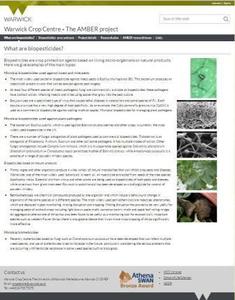
Knowledge sharing for biopesticide efficacy
Britain’s Agricultural and Horticultural Development Board (AHDB) is seeking to boost the efficacy of biopesticides by improving users’ knowledge about which products should be used under which circumstances and providing more details on how they should be applied in practical situations.
Observation trials conducted in 2016 as part of the five-year AMBER project “highlighted several opportunities to improve biopesticide performance through changes to application practices, based on improved understanding of the optimum conditions required for good performance of each biopesticide. This includes quantity of product used, quantity of water, location within the crop that should be targeted and other environmental parameters that could influence performance.”
The AHDB-funded project is seeking to identify management practices growers could use to improve the performance of biopesticide products within Integrated Pest and Disease Management programmes (IPDM).
David Chandler, principal research fellow at University of Warwick, told the AHDB Horticulture website: “It was clear from our observation trials that there was a lack of understanding about how biopesticide efficacy is affected by factors such as population sizes of pests and diseases, environmental factors such as exposure to UVA and B and water volumes. More information needs to be given to growers on how to apply biopesticides in practical situations. This could be done through modifications to improve labelling.”
Joe Martin, crop protection senior scientist at AHDB, told the site: “In a survey we conducted as part of AMBER, we found that growers perceived biopesticides to be unreliable, however we believe this could be in part as a result of incorrect applications. We need to make sure growers are provided with as much knowledge as possible about the optimum conditions required for good performance of each biopesticide in order to identify potential improvements in application.”
Over the next 20 years, AHDB expects the number of low-risk and often residue-exempt biopesticides available to growers to exceed the number of conventional chemical pesticides, hence the importance of ensuring they are used in the most effective way possible.
Gracie Emeny, knowledge exchange manager at AHDB, said: “There is a huge opportunity to improve biopesticide performance by helping to increase growers’ knowledge in this area. Clear guidance needs to be given to growers to help them get the best from biopesticides and improve their IPDM programmes, particularly as the conventional chemical options available to them continue to reduce. A key part of AMBER will be sharing knowledge and experience from the trials with growers and the industry to improve best practice guidelines.”
For more information:
- Read more on the AHDB Horticulture website
- Visit the recently launched AMBER project website
Last update: 24/05/2023 - ENDURE © 2009 - Contact ENDURE - Disclaimer
